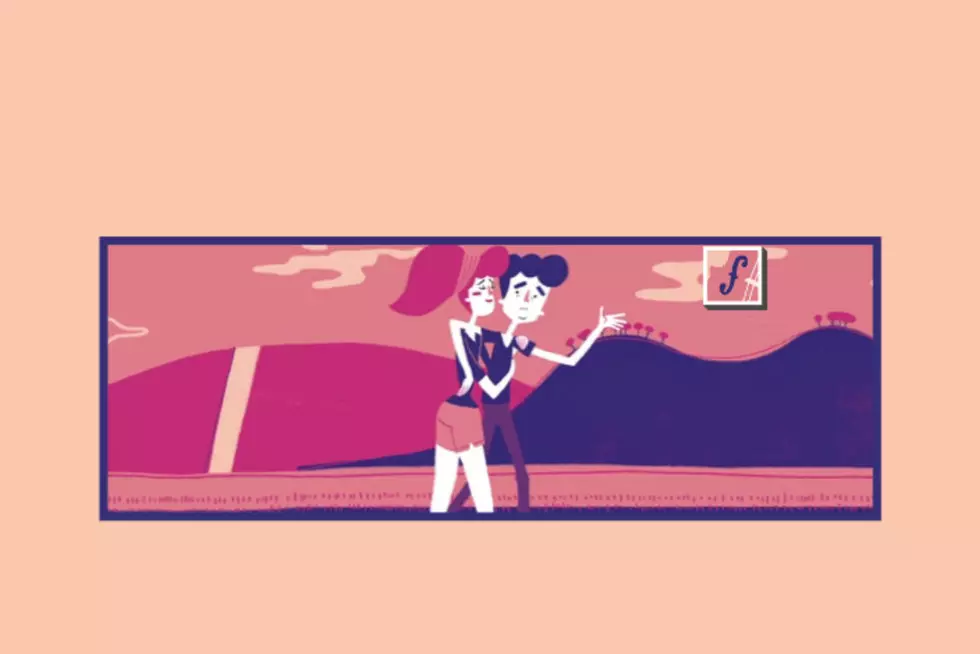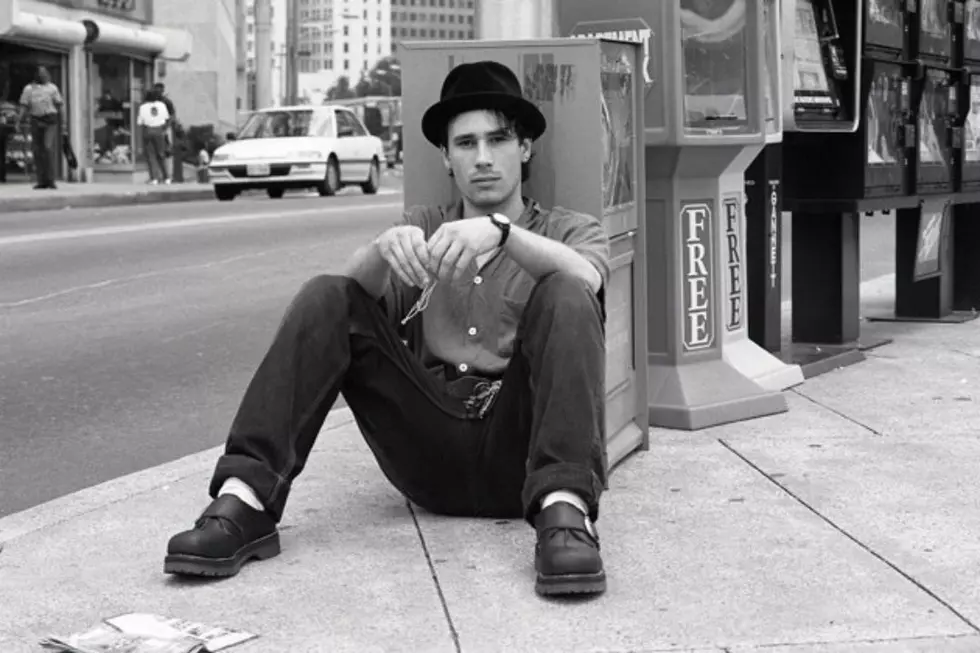
The Follow-Up: Jeff Buckley’s ‘Sketches for My Sweetheart the Drunk’
In ‘The Follow-Up,’ we take a look back at the album that came right after an artist’s most iconic record. In this installment, we spotlight the Jeff Buckley collection, ‘Sketches for My Sweetheart the Drunk,’ released three years after his debut, ‘Grace,’ and just months following his death in 1997.
Jeff Buckley had an intensely specific vision for what he wanted his second full-length to be, and ‘Sketches for My Sweetheart the Drunk,’ wasn’t it. What we have instead is a double album comprised of two completely different records – one Buckley had already scrapped and one he was just beginning to piece together in Memphis during the spring of 1997 when a spur-of-the-moment swim in the Wolf River Harbor turned into the last time anyone saw the 30-year-old alive.
As a result, the world only got one official release from Buckley – an eternally troubled but intensely charismatic troubadour from New York City's East Village – and it was 1994’s critically lauded ‘Grace.’ Sprawling in jangly, romantic sound and almost operatic thanks to Buckley’s four-octave falsetto, the album wasn’t a commercial success at the time, but it placed the stringy singer-songwriter firmly on the musical landscape and set the bar almost too high for Buckley to ever reach again. In a way, it was the last thing the hyper-sensitive, notorious perfectionist needed.
Buckley already struggled to live up to expectations – those of the die-hard fans who had watched him come up playing intimate New York venues like Sin-e, the suits at Columbia Records who took a chance on him and, far above all, his own. The son of folk singer Tim Buckley (who released nine albums between 1966 and 1974), Jeff Buckley barely knew his father and only saw him during a week when he was 8 before Tim died of a drug overdose in 1975 at age 28. Still, Jeff Buckley forever saw himself in the shadow of his father’s career – one that saw attempts to stretch creatively hampered by label interference. More than anything, however, it made the younger Buckley incredibly wary of the record industry and fame in general.
The music he had in mind was raw and stripped down – something with an underlying punk aesthetic.
All of that, along with his perceived need to provide Columbia with a money-maker after ‘Grace,’ amounted to a world of self-imposed pressure on Buckley’s shoulders. After spending much of 1994 through the early part of 1996 on tour, he turned his focus inward on new material, but the process was a painful one. The music he had in mind was raw and stripped down – something with an underlying punk aesthetic. But he had a difficult time getting on the same page with his band members and the label reps had their own preconceived notion of what his sophomore album should sound like: lush, glossy and produced by a seasoned vet with a proven track record of manufacturing hits – someone like Butch Vig (who helmed Nirvana’s ‘Nevermind’) or frequent U2 collaborator Steve Lillywhite.
But Buckley had someone else in mind. He had met Tom Verlaine – temperamental frontman for the influential but decidedly non-commercial post-punk act Television – and although Verlaine hadn’t really heard Buckley’s music, the pair were kindred spirits. Despite the fact that Columbia vehemently disagreed with the decision, the label fronted enough money for Buckley and his band to record four songs with Verlaine at a downtown Manhattan studio in June 1996. But it wasn’t entirely clear what they would be working on (maybe the songs would be released as an EP or just serve as demos for the album), and while Verlaine was expecting to produce songs that were entirely fleshed out, Buckley intended to use the time to explore his new direction.
Although the sessions were incredibly tense (Verlaine insisted Buckley find a new drummer and could be something of a bully in the studio), they came away with four songs: the bittersweet ‘Morning Theft’; a driving mini-epic called ‘Vancouver’; the haunting ‘You & I’ which Buckley recorded by himself in one night while singing a cappella; and ‘The Sky Is a Landfill’ -- a seething anti-media commentary.
Buckley, however, was openly unhappy with the results and believed the sound of the songs was too conventional. It was around this time that, at the prompting of his friends in Memphis indie outfit the Grifters, he became enamored with the idea of recording in Tennessee. While distractions were rampant in New York, he yearned for an existence that was less complicated and moved into a mostly empty shotgun shack in early 1997. He began playing weekly at a bar in downtown Memphis and started to regain his creative footing.
Verlaine and Buckley's band traveled to Memphis that February and laid down more songs at a local studio over two weeks. They came away with another batch of songs including the ominous rocker 'Nightmares by the Sea;' the sultry, R&B-tinged 'Everybody Here Wants You'; the atmospheric but half-formed 'New Year's Prayer'; and 'Yard of Blonde Girls' -- a swaggering song written by Audrey Clark of the 360s -- which was recorded in two quick takes.
After the band returned to New York, Verlaine remained with Buckley a few more days and the pair worked on more tracks, including 'Opened Once.' But even the new recordings weren't to Buckley's liking and, after a mild breakdown, he came to the realization that Verlaine wasn't the right man for what he had in mind. Although he wanted to helm the album on his own, he agreed to re-team with 'Grace' producer Andy Wallace and remained in Memphis to write.
Living a mostly solitary existence with only a handful of friends, he spent much of his time exploring nature and immersing himself in the local culture. In the meantime, he had found renewed focus in his writing and laid down nearly an album's worth of new material alone on his four-track recorder. Among them were 'I Know We Could Be So Happy Baby (If We Wanted to Be)' and a cover of Genesis' 'Back In N.Y.C.' Although the songs were incredibly experimental and, at times, a cacophony of discordant sounds, they clearly cut to the core of Buckley's mindset and everyone involved with the project regained inspiration.
That May, everyone was set to return to Memphis to work on what Buckley planned to title 'My Sweetheart the Drunk.' But the same day that his band arrived in town, Buckley and one of his roadies made an impromptu stop at the banks of the Wolf River Harbor, a slack water channel of the Mississippi River where Buckley had swum several times before. He walked into the water wearing all of his clothes and swam to where he could no longer be seen. While locals knew the current and undertow were nothing to play around with, the wide-eyed Buckley was overcome. His body was found several days later some distance down river.
The following months were devastating and confusing for those who had been close to Buckley, and there was extensive debate about what to do with everything he had recorded for his second album. Although Buckley had reportedly told his bandmates he wanted them to burn the Verlaine tapes once the real album was recorded, Columbia provided Wallace with the ten tracks and planned to release them that fall under Buckley's title. That plan was nixed, however, at the repeated insistence of Buckley's mother, Mary Guibert, who since took control of his estate. Under her direction, the album was expanded to include both the Verlaine songs and the rough demos Buckley had recorded on his own. She decided to rename it 'Sketches for My Sweetheart the Drunk,' and included personal letters written by Buckley in the liner notes as a sort of lasting chronicle of her son's legacy.
While the album isn't considered an official second record by Buckley, it's by far the most significant and evocative of all the posthumous live albums and collections (of which there are many) released under his name. It's an aural time capsule to his final months and provides an almost invasive personal insight into his thoughts. He likely didn't want the public to hear the Verlaine songs, and the demos he did like were just that -- demos. Crude and informal, the songs as they appear on 'Sketches' only hint at what Buckley would have done with them with his entire band and the help of a Grammy-winning producer.
Still, for all its controversy and the agony Buckley put himself through while creating it, 'Sketches for My Sweetheart the Drunk' remains a landmark release. Buckley was way too critical of the Verlaine songs and the first disc of the collection is filled with chill-inducing moments and a kind of urgency that we hadn't heard from him before. And the demos that make up the second disc -- although raw and often out-of-tune -- prove that Buckley had stumbled upon an intriguing new direction.
Though we may never know exactly what the future had in store for him, this album -- or these two albums -- remain vital listening and provide a frustrating glimpse at the unrealized brilliance we never got to hear.
More From Diffuser.fm









